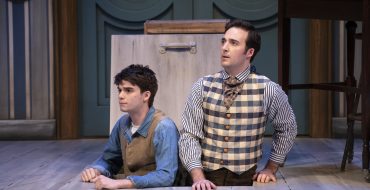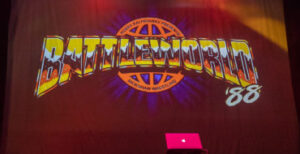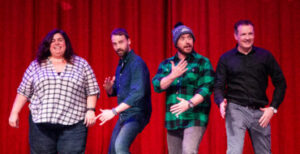The Arts Club production of Thornton Wilder’s The Matchmaker is a nostalgia piece, but at least it’s nostalgic for something good. The play’s wry one-liners crackle as much as ever, though your own mileage may vary depending on how you feel about the sort of comedy that begins with a rich and demanding businessman named Horace Vandergelder and ends with a multitude of marriages. This is not, in other words, the material that’s going to finally bring hip young audiences back to the theatre.
Accompanying Mr. Vandergelder is a host of names you’d never find in any other genre. Irene Molloy is a starry-eyed hat shop owner dreaming of the socialite’s life. Cornelius Hackl and Barnaby Tucker are hapless Vandergelder employees whose search for adventure brings them to her shop. Ambrose Kemper is the sensitive young artist barred by Vandergelder from marriage to the perpetually breathless Ermengarde. And pulling all the strings, of course, is the incorrigible Mrs. Dolly Levi. For better and worse, the performances look like the names sound.
Here are some things that are good about The Matchmaker, which is more or less an exactly mediocre production: the cast is inconsistently very funny; the sets are inconsistently very lovely; and the pratfalls, mugging, and comedy of class transgression occasionally feel mildly relevant. If you’re in the mood for a jaunty old tune played with as many flourishes as wrong notes, you probably won’t be disappointed. “Cute,” one audience member remarked at the intermission. And another, elsewhere in the lobby: “It’s so cute, isn’t it?”
This is one of those productions where you end up measuring the performances against the tradition. For the most part, the slapstick isn’t gut-laugh funny, but laugh-of-recognition funny. The whole experience has a bit of this mediated feeling: imagine how funny this joke would have been then. There are a couple truly excellent physical gags, one each courtesy of Hackl and a closet, and Tucker and a tablecloth. But the play is paced and engineered like a television show—barely a moment of quiet throughout—and frequently, both the comic highs and the dramatic lows fail to land because of it.
Really, the play’s whole charm is built on then, and the biggest problem is that the actors are from now. Too often, it’s a comedy of manners without attention to manner. Ric Reid as Horace Vandergelder and Naomi Wright as Irene Molloy, taken in isolation, turn in proficient and occasionally affecting performances. But to watch them together is not to see a female small-business owner interact with a well-known “half a millionaire” gentleman caller at the turn of the century. From the start, Vandergelder seems to expect no deference, and Molloy offers none. Again and again, the humour falls flat as characters treat Vandergelder and the things of his class with impertinence and manipulation, because these transgressions do not feel like risks. Too many of the actors fail, in the play’s first act, to fully inhabit the societal role that they are meant to comically break out of.
Aside from the few inspired moments of slapstick, the show offers some surprises in its creatively staged interludes and especially in the wonderfully dynamic and oddball performance of a particular late-arriving character. You could do worse than Wilder’s play, and you could do worse to Wilder’s play. Just don’t expect this adaptation to be a whole lot more than…well, cute.









